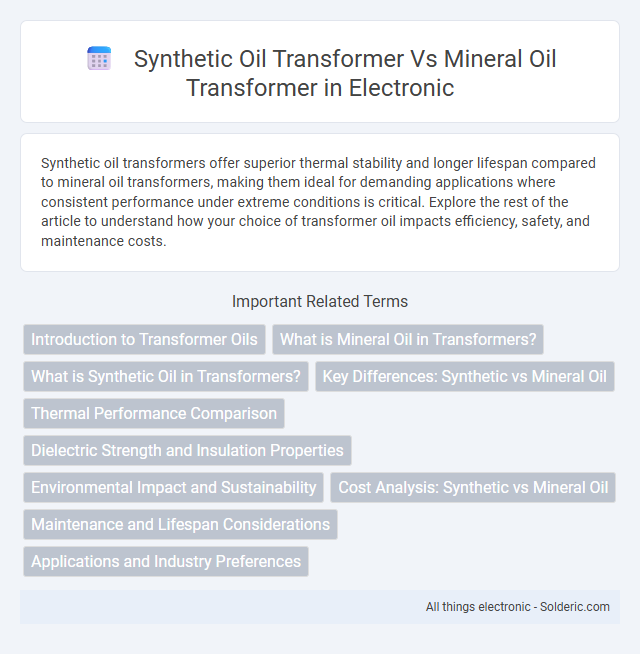Synthetic oil transformers offer superior thermal stability and longer lifespan compared to mineral oil transformers, making them ideal for demanding applications where consistent performance under extreme conditions is critical. Explore the rest of the article to understand how your choice of transformer oil impacts efficiency, safety, and maintenance costs.
Comparison Table
| Feature | Synthetic Oil Transformer | Mineral Oil Transformer |
|---|---|---|
| Base Fluid | Synthetic hydrocarbons or esters | Refined petroleum oil |
| Dielectric Strength | Higher dielectric strength | Moderate dielectric strength |
| Fire Point | High fire point (around 300degC) | Lower fire point (around 150degC) |
| Environmental Impact | Biodegradable and less toxic | Non-biodegradable, toxic if spilled |
| Oxidation Stability | Superior oxidation resistance | Prone to oxidation, requires antioxidants |
| Temperature Range | Wide operating temperature range | Narrower temperature tolerance |
| Cost | Higher initial cost | Lower cost and widely available |
| Applications | High-performance and environmentally sensitive areas | Standard power transformers |
Introduction to Transformer Oils
Synthetic oil transformers offer enhanced thermal stability and longer service life compared to mineral oil transformers, making them ideal for high-performance and demanding environments. Mineral oil transformers remain widely used due to their cost-effectiveness and established insulating properties, although they are more prone to oxidation and degradation over time. The choice between synthetic and mineral oils depends on factors like operating temperature, environmental conditions, and maintenance requirements.
What is Mineral Oil in Transformers?
Mineral oil in transformers is a petroleum-derived insulating fluid used for cooling and electrical insulation within transformer tanks. It features excellent dielectric properties, thermal stability, and cost-effectiveness, making it a common choice in power transformers. However, mineral oil is flammable and biodegradable at a slow rate, raising environmental and fire safety concerns compared to synthetic alternatives.
What is Synthetic Oil in Transformers?
Synthetic oil in transformers is a man-made insulating fluid designed to enhance thermal performance and electrical insulation compared to traditional mineral oil. It offers superior oxidation stability, higher flash points, and better biodegradability, improving transformer durability and safety. You benefit from reduced maintenance needs and longer transformer life when selecting synthetic oil over mineral oil.
Key Differences: Synthetic vs Mineral Oil
Synthetic oil transformers offer superior thermal stability and oxidation resistance compared to mineral oil transformers, enhancing lifespan and reducing maintenance frequency. Your transformer using synthetic oil benefits from a wider operating temperature range and improved fire safety due to lower flammability. Mineral oil transformers, while cost-effective and widely used, generally require more frequent monitoring and replacement owing to faster degradation and higher environmental impact.
Thermal Performance Comparison
Synthetic oil transformers exhibit superior thermal performance compared to mineral oil transformers, with higher thermal stability and a broader operating temperature range. Their enhanced heat dissipation capabilities reduce the risk of thermal degradation, enabling longer transformer lifespan and improved reliability. Synthetic oils maintain consistent viscosity and insulating properties at elevated temperatures, outperforming mineral oils in thermal endurance and efficiency.
Dielectric Strength and Insulation Properties
Synthetic oil transformers exhibit superior dielectric strength compared to mineral oil transformers, enabling better resistance to electrical breakdown and enhanced operational safety. The insulation properties of synthetic oils offer greater thermal stability and higher flash points, reducing the risk of fire and extending transformer lifespan. Advanced synthetic fluids also maintain consistent performance under extreme temperatures, ensuring reliable dielectric insulation and improved transformer efficiency.
Environmental Impact and Sustainability
Synthetic oil transformers exhibit a lower environmental impact than mineral oil transformers due to their superior biodegradability and reduced toxicity in case of leaks or spills. Your choice of synthetic oil enhances sustainability efforts by extending transformer lifespan and improving thermal stability, which minimizes the frequency of oil changes and waste generation. Mineral oil, while commonly used, presents higher risks of soil and water contamination, making synthetic oils a more eco-friendly alternative for transformer insulation and cooling.
Cost Analysis: Synthetic vs Mineral Oil
Synthetic oil transformers generally have a higher initial cost due to the advanced refining processes and enhanced fire resistance properties compared to mineral oil transformers. Over the transformer's lifecycle, synthetic oils offer longer service intervals and better thermal stability, potentially reducing maintenance and replacement expenses. Mineral oil transformers remain more cost-effective upfront but may incur higher long-term costs related to oil degradation, fire risk, and environmental disposal.
Maintenance and Lifespan Considerations
Synthetic oil transformers offer superior oxidation stability and thermal conductivity compared to mineral oil transformers, resulting in extended maintenance intervals and reduced downtime. The enhanced dielectric properties of synthetic oils contribute to longer insulation life and improved performance under high-temperature conditions. Consequently, synthetic oil transformers often provide a longer operational lifespan with lower frequency of oil replacement and diagnostic testing.
Applications and Industry Preferences
Synthetic oil transformers are preferred in industries requiring enhanced thermal stability and fire safety, such as power plants, data centers, and marine installations, due to their superior oxidation resistance and lower flammability compared to mineral oil transformers. Mineral oil transformers remain dominant in general-purpose applications like distribution and rural electrification because of their cost-effectiveness and widespread availability. The choice between synthetic and mineral oil transformers hinges on specific application needs, regulatory compliance, and operational environment risks.
synthetic oil transformer vs mineral oil transformer Infographic

 solderic.com
solderic.com